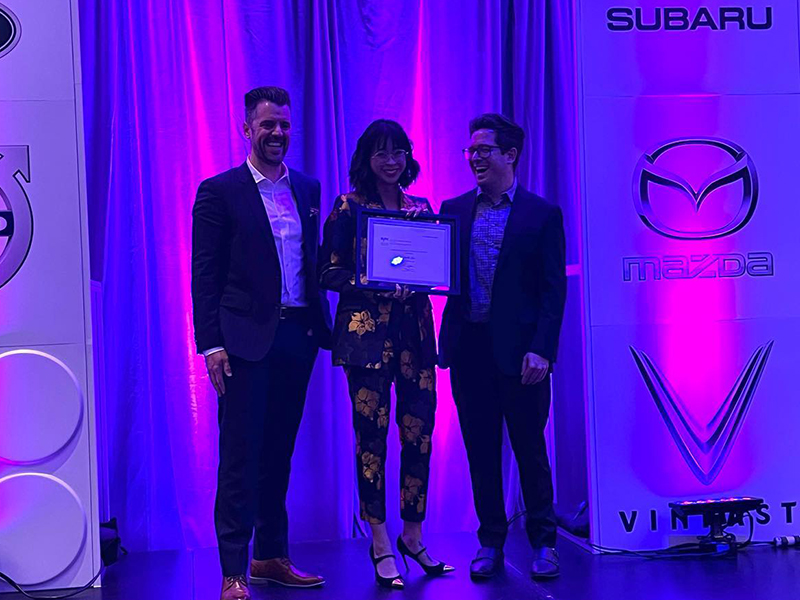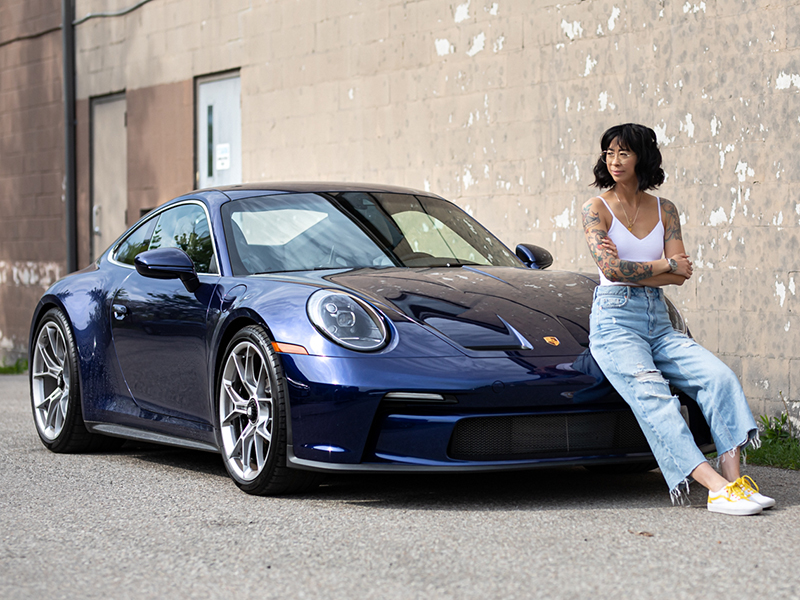Alum Jodi Lai wins AJAC's 2022 Journalist of the Year Award
Jodi Lai’s passion for cars fueled her ambition to a career in automotive journalism. She expected to use her storytelling skills to review cars. But Lai, ‘09, didn’t expect she’d also be reflecting on her ethnic and racial identity as an Asian woman that made her confident to unapologetically show up as herself.
That may well be why she has been named the 2022 Journalist of the Year by the Automobile Journalists Association of Canada (AJAC).
“This award represents the pinnacle of automotive journalism in Canada and is the most esteemed automotive writing award available in the country,” according to AutoTrader (external link) . She was also a runner-up for the Feature Writing Award.
Lai is the Autotrader editor-in-chief and has been working in the automotive journalism industry for over 15 years. She is the first woman of colour and Asian person to win the award.

Jodi Lai receiving the Journalist of the Year 2022 award. (Photo courtesy of Jodi Lai)
“It was really significant for me, because I have worked so hard to get where I'm going … I even got a ‘I'm proud of you’ from my Asian parents which, you know, never happens!” she says.
But, the journey to this achievement was not an easy one for Lai, as a woman of colour working in a niche industry that is dominated by men.
She says “For a long time, I always felt like I had to prove myself [that] I deserve to be an automotive journalist in this field, and even after 15 years of doing this people still question my abilities, my talent or my knowledge, so continuing to prove people wrong is a really weird motivator for me.”
Finding the voice that fuels her unique perspective
As a complete outsider to the automotive journalism field, Lai decided to use her experience, her position and her perspectives to develop a completely different approach writing about cars.
As she started weaving her own experiences into her writing, people noticed. “‘Jodi, those pieces were so fiercely you,’ and when I heard that, I just started crying,” Lai recalls.
Putting her “soul on the line” by sharing her experiences as a first-gen, woman of colour in a male-dominated space, helped her connect with her readers in a different, meaningful way, she said. Her “creativity blossomed” when she recognized that the parts of her identity that made her stand out in a crowd, were the same attributes that informed her unique style of writing.
“I talk about internalized racism in some of my stories, which has nothing to do with cars on the surface. When you peel back those layers it is in everything, and you can't you can't avoid those topics, even in the automotive sphere,” Lai says.
That does not mean that she didn’t receive any pushback. Early in her career Lai was often advised to change up her writing style by her white male editors and colleagues who shared a different point of view. In the past few years she has grown to be more comfortable in her voice and perspective, and that, she suspects, is why she was honoured with the award.
“Getting that validation from other people just confirmed to me that my point of view is important, but that other people can also relate to it,” Lai says.
One story in particular that Lai is proud of, Lunar New Year Porsche Macan Poses an Interesting Paradox (external link) , stemmed from speaking about her experiences with internalized fear and racism. She was asked to review the 2022 Porsche Macan during the period of the Lunar New Year. The car was wrapped in gold and tiger print with messages of good luck and prosperity and at first, Lai was excited to give it a ride.
Once she was actually on the road, she unexpectedly found herself afraid for her safety. She felt like “someone really unhinged” could potentially run her off the road or vandalize the car. Being in a vehicle that was meant to signify a time for celebration and togetherness, now made her feel like a potential target of hate.
A moment of vulnerability that sparked solidarity
Lai recalls watching the award-winning movie, Crazy Rich Asians, which she describes as being “a huge turning point for a lot of Asian people.” It was an emotional moment, seeing the theatre packed with other Asian people who felt seen for the first time.
Digesting the messages relayed from the film helped her work through the internalized racism she experienced growing up. It gave her confidence in speaking about her own experiences as an Asian woman in the automotive journalism industry.
She realized, “I'm going to talk about it and I don't really care what the fallout is.”

Jodi Lai photographed for her review, The Porsche 911 GT3 Touring Literally Made Me Cry (external link) (Chris Smart/csmartfx.com)
Since the start of the pandemic, many people who are a part of the Asian community experienced an increase in the targeted hate that they were receiving, and it is still on the rise (external link) .
Lai decided that she was going to be transparent and raw about her experience and the feedback she received blew her away.
“I've learned that if there is something that only I can tell, because nobody else has experienced this exact same moment the way I have, then it's worthy of other people to see it,” she says.
Many people of Asian descent reached out and explained how reading about that internalized fear, that stems from racism, was validating. One woman in particular told Lai that she was afraid to have her kids dress up in celebratory attire for the Lunar New Year at their school. Other readers also related to her unique experience and that is why she continues to write these stories and maintains her personal approach.
“They really began to understand that it is not okay to feel that fear, and that it is not your fault that you feel that fear,” she says.
Advice for emerging journalists of colour in the industry
“Lean into those things that make you different and unique, because that gives you so much power, it really helps differentiate yourself from every other writer out there.” Lai says.
She says honing in that personal voice that makes you stand out from the crowd, makes you a better journalist. She encourages young journalists, particularly ones of colour, to try and reflect internally and unpack the things they have been taught. It is a skill she considers can create the largest impact with your own self but also with your storytelling.
Even though there are those who may criticize her for it, Lai plans to continue writing from her experiences as a Chinese person and being a child of immigrant parents.
She hopes to tell her truth with every piece of automotive journalism work that she does, and that it resonates with those who need to hear it.
